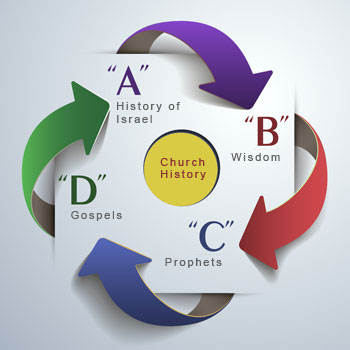
[1]
…the Hebrew Bible just isn’t a theological textbook. It contains a lot of narratives and its narrative materials are an account of the odyssey of a people, the nation of Israel.
…the Bible is not for naïve optimists. It’s hard-hitting stuff. And it speaks to those who are courageous enough to acknowledge that life is rife with pain and conflict, just as it’s filled with compassion and joy.
The Bible is a library… wonderful narrative stories… all kinds of law… texts that prescribe how some ceremony is supposed to be performed… the messages of prophets… lyric poetry… love poetry… proverbs.. psalms of thanksgiving and lament…
The Bible clearly had many contributors over many centuries, and the individual styles and concerns of those writers, their political and religious motivations, betray themselves frequently.
…the Bible… treats issues… It uses the language of story and song and poetry and paradox and metaphor.
Each book, each writer, each voice reflects another thread in the rich tapestry of human experience, human response to life and its puzzles, human reflection on the sublime and the depraved…
…the Bible’s not for children.
…biblical characters are real people with real, compelling moral conflicts and ambitions and desires, and they can act shortsightedly and selfishly.
There are episodes of treachery and incest and murder and rape.
Jacob is a deceiver; Joseph is an arrogant, spoiled brat; Judah reneges on his obligations to his daughter-in-law and goes off and sleeps with a prostitute…
But they can also, like real people, learn and grow and change…
There are… all kinds of paradoxes and subtle puns and ironies…
…the Bible… makes its readers work… The conclusions have to be drawn by the reader.[2]
- “Advanced Reading Loop – Reading Method.” ARLBible.org. Accessed 11 Nov. 2016.
- Hayes, Christine. “1. The Parts of the Whole.” RLST 145: Introduction to the Old Testament (Hebrew Bible). Yale University, 2008, oyc.yale.edu/religious-studies/rlst-145#overview. Accessed 11 Nov. 2016.